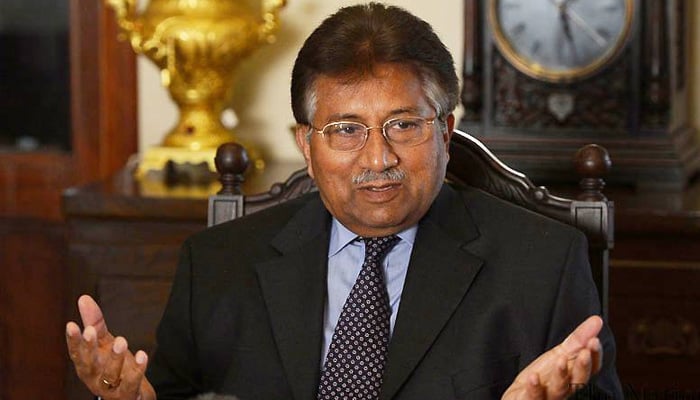Treason case: Interpol declines Pak request for arresting Musharraf
The Ministry of Interior on Wednesday informed the Special Court hearing the high treason case against former military ruler Pervez Musharraf that Interpol has declined Pakistan’s request for the arrest of Musharraf.
ISLAMABAD: The Ministry of Interior on Wednesday informed the Special Court hearing the high treason case against former military ruler Pervez Musharraf that Interpol has declined Pakistan’s request for the arrest of Musharraf.
The Special Court comprising Justice Yawar Ali and Justice Nazar Akbar resumed hearing on the complaint lodged by the former PML-N government seeking initiation of high treason proceedings against Musharraf for imposing emergency rule on November 3, 2007. Secretary Interior Yousaf Nasim informed the court that Interpol has refused to issue red warrants of Musharraf, saying red warrant cannot be issued in political nature cases.
“Interpol officials had said that the high treason case doesn’t fall under their legal ambit,” he added. Justice Yawar Ali directed the federal government to decide as to how the treason case against the former president could be decided in his absence.
The court also asked the interior secretary to submit Interpol’s reply. The interior secretary in response said he will submit it. Further, Justice Yawar questioned if Musharraf’s statement under Section 342 of the Criminal Procedure Code (342CrPc) in the case can be recorded via Skype. “Can the investigation move forward without the statement under 342CrPc in the case?” he asked.
Adjourning the case till September 10, the court ordered that during the next hearing arguments be given over whether Musharraf’s statement can be recorded via Skype or the investigations can move forward without it.
It is pertinent to mention here that Muhammad Akram Sheikh, head of the prosecution team in the high treason case against Musharraf, two days ago had sought permission from the Special Court for withdrawal from the prosecution. He submitted that he had rendered appearance in this case with utmost dedication and was mindful of the implications that it is not only a case of first impression but also entails risk to one’s personal security, professional practice, risk and threat of security to the family. He contended that since the first hearing of the case on Dec 24, 2013, he has been appearing diligently in the matter and cannot reconcile the letter of special law and its sporadic application in this case.
He submitted that since the case involves a fundamental civil-military relationship, the new federal government must have an opportunity to decide how they would like to handle this case.
During the previous hearings, Akram Sheikh had repeatedly pleaded before the court to issue directives for arrest of Musharraf and his production as well. In May 2016, the court had declared Musharraf absconder under Section 87 of the Criminal Procedure Code and directed the Federal Investigation Agency (FIA) to produce him before it on July 12, 2016.
Musharraf had expressed his willingness to face the trial under the army’s protection and on a surety from the court that he would be given a safe passage to return to Dubai.
-
 Cuba-Canada Travel Advisory Raises Concerns As Visitor Numbers Decline
Cuba-Canada Travel Advisory Raises Concerns As Visitor Numbers Decline -
 Anthropic Buys 'Super Bowl' Ads To Slam OpenAI’s ChatGPT Ad Strategy
Anthropic Buys 'Super Bowl' Ads To Slam OpenAI’s ChatGPT Ad Strategy -
 Prevent Cancer With These Simple Lifestyle Changes
Prevent Cancer With These Simple Lifestyle Changes -
 Air Canada Flight Diverted St John's With 368 Passengers After Onboard Incident
Air Canada Flight Diverted St John's With 368 Passengers After Onboard Incident -
 Experts Reveal Keto Diet As Key To Treating Depression
Experts Reveal Keto Diet As Key To Treating Depression -
 Inter Miami Vs Barcelona SC Recap As Messi Shines With Goal And Assist
Inter Miami Vs Barcelona SC Recap As Messi Shines With Goal And Assist -
 David Beckham Pays Tribute To Estranged Son Brooklyn Amid Ongoing Family Rift
David Beckham Pays Tribute To Estranged Son Brooklyn Amid Ongoing Family Rift -
 Jailton Almeida Speaks Out After UFC Controversy And Short Notice Fight Booking
Jailton Almeida Speaks Out After UFC Controversy And Short Notice Fight Booking -
 Extreme Cold Warning Issued As Blizzard Hits Southern Ontario Including Toronto
Extreme Cold Warning Issued As Blizzard Hits Southern Ontario Including Toronto -
 Lana Del Rey Announces New Single Co-written With Husband Jeremy Dufrene
Lana Del Rey Announces New Single Co-written With Husband Jeremy Dufrene -
 Ukraine-Russia Talks Heat Up As Zelenskyy Warns Of US Pressure Before Elections
Ukraine-Russia Talks Heat Up As Zelenskyy Warns Of US Pressure Before Elections -
 Lil Nas X Spotted Buying Used Refrigerator After Backlash Over Nude Public Meltdown
Lil Nas X Spotted Buying Used Refrigerator After Backlash Over Nude Public Meltdown -
 Caleb McLaughlin Shares His Resume For This Major Role
Caleb McLaughlin Shares His Resume For This Major Role -
 King Charles Carries With ‘dignity’ As Andrew Lets Down
King Charles Carries With ‘dignity’ As Andrew Lets Down -
 Brooklyn Beckham Covers Up More Tattoos Linked To His Family Amid Rift
Brooklyn Beckham Covers Up More Tattoos Linked To His Family Amid Rift -
 Shamed Andrew Agreed To ‘go Quietly’ If King Protects Daughters
Shamed Andrew Agreed To ‘go Quietly’ If King Protects Daughters




